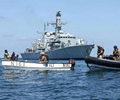

Threats like human trafficking, narcotics, terrorism through sea lanes, piracy and exploitation of natural resources are real maritime security concerns.
On Monday UNSC unanimously adopted the first Presidential Statement (PRST) of the Council on Maritime Security. The PRST has categorically reaffirmed that international law, under the UN Convention on the Law of the Sea of 10 December 1982 (UNCLOS), is the main legal framework applicable to activities in the oceans. And, it recognizes the importance of enhancing international and regional cooperation to counter threats to maritime safety and security.
Most importantly the UNSC has recognized the need to strengthen the capacity of Member States and invited them to share their experiences with others, the United Nations Office on Drugs and Crime (UNODC) and the International Maritime Organization on the possible gaps and vulnerabilities at sea.
Problems at Sea
It has highlighted the problem of transnational organized crimes which are committed at sea: smuggling of migrants, trafficking in persons and illicit trafficking in firearms, illicit trafficking in narcotic drugs and psychotropic substances, and other illicit activities.
In her address during the open debate on Maritime Cooperation initiated by India, Ghada Fathy Ismail Waly, Executive Director of UNODC, urged the Member states to focus on securing the seas and concerted international efforts to scale back vulnerabilities.
She highlighted four areas of action to be considered by the UNSC including the implementation of the international legal framework; promoting holistic crime prevention responses; building capabilities; and expanding partnerships.
UNODC is also working with India’s Information Fusion Centre for the Indian Ocean Region (IOR).
What is IFC-IOR?
This is based in Delhi NCR and it uses the Merchant Ship Information System (MSIS) software, which is a collaborative tool used for its day-to-day functioning.
It then collates information from various sources and then develops a Comprehensive Operation Picture of the region and then shares this with partner countries. With this sort of information, the merchant vessels moving in the waters are being monitored. This helps in cutting down maritime crimes.
Human Trafficking
As has been reported earlier by Financial Express Online, the Human Trafficking did not get impacted by the global pandemic of COVID-19.
The movement of the migrants from India and neighbouring countries like Nepal, Bangladesh, Sri Lanka which had paused for a while during the global lockdown between 2020-21, are now ready to move. They pay several thousands of dollars for chasing their dreams to countries like the US, and Canada. They start their journey from a country located in either South America or Central America traversing through difficult terrain. Because of different visa requirements they start from Brazil, Chile, Bolivia, Ecuador, Peru, Costa Rica, Nicaragua, El Salvador, Paraguay, Colombia, and Guatemala. And not all reach their destinations. They are either killed on their way or they die due to accidents and other attacks at sea.
The UNODC has a Global Maritime Crime Programme which started in 2009 with a budget of 300,000 dollars. This programme was started to address the threat of Somali piracy and has since then expanded and now has a budget of around USD 230 million. And now provides support for legal reform and capacity building; simulated trials, maritime training centres and more.
How does this work?
There are 170 personnel who are positioned in 26 Member states and focus in Latin America and the Caribbean; the Gulf of Aden and the Red Sea; and the Mediterranean and the Black Sea; the Indian Ocean; the Atlantic and Pacific Oceans.
The UN body works in coordination with regional organizations and other partners and to give assistance to deal with a vast range of maritime crimes.
The Yaoundé maritime safety and security architecture is supported by UNODC. Experts are provided to the Interregional Coordination Centre which addresses maritime safety and security in Central and West Africa.
Advanced Technologies and data are also being provided by UNODC to Member states to help in the fight against maritime crime with the help of maritime domain awareness infrastructure, Satellite imagery, and radar systems.
Source: Financial Express